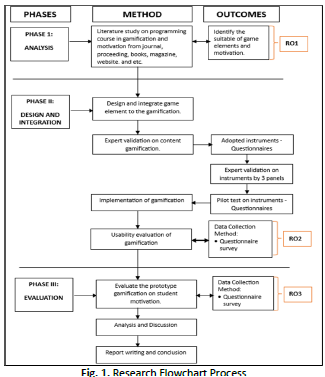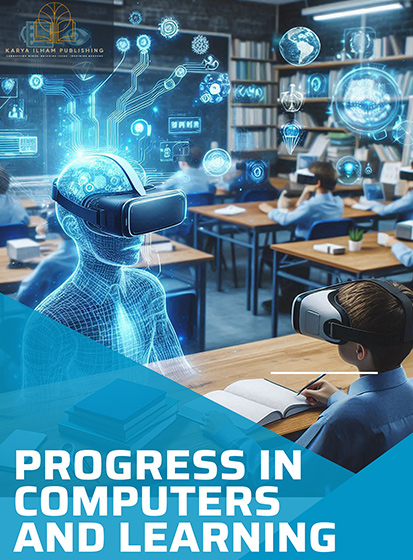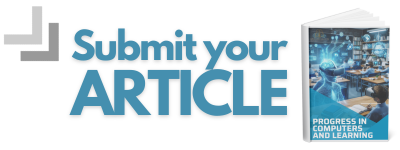Enhancing Usability in Gamified Computer Programming Courses for Higher Education
DOI:
https://doi.org/10.37934/picl.2.1.111Keywords:
Gamification, usability, intrinsic motivation, computer programming, self-directed learningAbstract
Gamification is increasingly recognized as an innovative educational approach that actively engages students in their learning journey. It has the potential to enhance the learning environment by making it more enjoyable and engaging, thereby benefiting education. This research focuses on boosting student intrinsic motivation in a Computer Programming Fundamentals course through gamification. The problem statement addresses the challenge of maintaining student motivation and interest in technical subjects like programming. The study aims to identify effective gamification elements, assess the usability of the gamified system, and evaluate their impact on student intrinsic motivation. A three-phase approach was used in this research: analysis, design and integration, and evaluation. A quantitative methodology, involving surveys, was employed to measure different aspects of usability testing which are usability, educational usability, and user experience. The results indicate high levels of usability across all measured constructs, with mean scores translating to percentages of 89.4% for usability, 89.6% for educational usability, and 89.0% for user experience. The findings highlight the positive impact of gamification on student intrinsic motivation in the Computer Programming Fundamentals course. By effectively incorporating game elements, students demonstrated improved usability, educational usability, and overall user experience in their learning process. This research contributes to the theoretical understanding of educational gamification, offers innovative methods for teaching programming, and promotes self-directed learning.
Downloads
References
[1] Shahid, Mahwish, Afifa Wajid, Kamran Ul Haq, Imran Saleem, and Abdul Haseeb Shujja. "A review of gamification for learning programming fundamental." In 2019 International Conference on Innovative Computing (ICIC), pp. 1-8. IEEE, 2019. https://doi.org/10.1109/ICIC48496.2019.8966685 DOI: https://doi.org/10.1109/ICIC48496.2019.8966685
[2] Maryono, Dwi, Sajidan Budiyono, and Muhammad Akhyar. "Implementation of gamification in programming learning: literature review." Int. J. Inf. Educ. Technol 12, no. 12 (2022): 1448-1457. https://doi.org/10.18178/ijiet.2022.12.12.1771 DOI: https://doi.org/10.18178/ijiet.2022.12.12.1771
[3] Swacha, Jakub, Ricardo Queirós, and José Carlos Paiva. "Towards a framework for gamified programming education." In 2019 International Symposium on Educational Technology (ISET), pp. 144-149. IEEE, 2019. https://doi.org/10.18178/ijiet.2022.12.12.1771 DOI: https://doi.org/10.1109/ISET.2019.00038
[4] Krath, Jeanine, Linda Schürmann, and Harald FO Von Korflesch. "Revealing the theoretical basis of gamification: A systematic review and analysis of theory in research on gamification, serious games and game-based learning." Computers in Human Behavior 125 (2021): 106963. https://doi.org/10.1016/j.chb.2021.106963 DOI: https://doi.org/10.1016/j.chb.2021.106963
[5] Ghai, Akanksha, and Urvashi Tandon. "Integrating gamification and instructional design to enhance usability of online learning." Education and information technologies 28, no. 2 (2023): 2187-2206. https://doi.org/10.1007/s10639-022-11202-5 DOI: https://doi.org/10.1007/s10639-022-11202-5
[6] Khaldi, Amina, Rokia Bouzidi, and Fahima Nader. "Gamification of e-learning in higher education: a systematic literature review." Smart Learning Environments 10, no. 1 (2023): 10. https://doi.org/10.1186/s40561-023-00227-z DOI: https://doi.org/10.1186/s40561-023-00227-z
[7] Cuervo-Cely, Karen D., Felipe Restrepo-Calle, and Jhon J. Ramírez-Echeverry. "Effect of gamification on the motivation of computer programming students." Journal of Information Technology Education: Research 21 (2022): 001-023. https://doi.org/10.28945/4917 DOI: https://doi.org/10.28945/4917
[8] Nah, Fiona Fui-Hoon, Qing Zeng, Venkata Rajasekhar Telaprolu, Abhishek Padmanabhuni Ayyappa, and Brenda Eschenbrenner. "Gamification of education: a review of literature." In HCI in Business: First International Conference, HCIB 2014, Held as Part of HCI International 2014, Heraklion, Crete, Greece, June 22-27, 2014. Proceedings 1, pp. 401-409. Springer International Publishing, 2014. https://doi.org/10.1007/978-3-319-07293-7_39 DOI: https://doi.org/10.1007/978-3-319-07293-7_39
[9] Páez-Quinde, Cristina, Daniel Morocho-Lara, and Marbella Escalante. "Gamification as a strategy in collaborative learning against virtual education in times of pandemic." In 2022 IEEE Global Engineering Education Conference (EDUCON), pp. 752-756. IEEE, 2022. https://doi.org/10.1109/EDUCON52537.2022.9766638 DOI: https://doi.org/10.1109/EDUCON52537.2022.9766638
[10] Deterding, Sebastian, Dan Dixon, Rilla Khaled, and Lennart Nacke. "From game design elements to gamefulness: defining" gamification"." In Proceedings of the 15th international academic MindTrek conference: Envisioning future media environments, pp. 9-15. 2011. https://doi.org/10.1145/2181037.2181040 DOI: https://doi.org/10.1145/2181037.2181040
[11] Khaleel, Firas Layth, Noraidah Sahari Ashaari, and Tengku Siti Meriam Tengku Wook. "An empirical study on gamification for learning programming language website." Jurnal Teknologi 81, no. 2 (2019). https://doi.org/10.11113/jt.v81.11133 DOI: https://doi.org/10.11113/jt.v81.11133
[12] Behl, Abhishek, Nirma Jayawardena, Vijay Pereira, Nazrul Islam, Manlio Del Giudice, and Jyoti Choudrie. "Gamification and e-learning for young learners: A systematic literature review, bibliometric analysis, and future research agenda." Technological Forecasting and Social Change 176 (2022): 121445. https://doi.org/10.1016/j.techfore.2021.121445 DOI: https://doi.org/10.1016/j.techfore.2021.121445
[13] Morschheuser, Benedikt, Lobna Hassan, Karl Werder, and Juho Hamari. "How to design gamification? A method for engineering gamified software." Information and Software Technology 95 (2018): 219-237. https://doi.org/10.1016/j.infsof.2017.10.015 DOI: https://doi.org/10.1016/j.infsof.2017.10.015
[14] Shafie, Azlinda, and Zaleha Abdullah. "Gamification in learning programming language." In SA conference series: Industrial revolution, vol. 4, pp. 181-187. 2020.
[15] Khaleel, Firas Layth, Noraidah Sahari Ashaari, Tengku Siti Meriam Tengku Wook, and Amirah Ismail. "Methodology for developing gamification-based learning programming language framework." In 2017 6th international conference on electrical engineering and informatics (iceei), pp. 1-6. IEEE, 2017. https://doi.org/10.1109/ICEEI.2017.8312378 DOI: https://doi.org/10.1109/ICEEI.2017.8312378
[16] Yamani, Hanaa Abdulraheem. "A conceptual framework for integrating gamification in elearning systems based on instructional design model." International Journal of Emerging Technologies in Learning (Online) 16, no. 4 (2021): 14. https://doi.org/10.3991/ijet.v16i04.15693 DOI: https://doi.org/10.3991/ijet.v16i04.15693
[17] Shorn, Siew Peng. "Teaching computer programming using gamification." In Proceedings of the 14th International CDIO Conference, pp. 1-10. 2018.
[18] Smiderle, Rodrigo, Sandro José Rigo, Leonardo B. Marques, Jorge Arthur Peçanha de Miranda Coelho, and Patricia A. Jaques. "The impact of gamification on students’ learning, engagement and behavior based on their personality traits." Smart Learning Environments 7, no. 1 (2020): 3. https://doi.org/10.1186/s40561-019-0098-x DOI: https://doi.org/10.1186/s40561-019-0098-x
[19] Kabilan, Muhammad Kamarul, Nagaletchimee Annamalai, and Kee-Man Chuah. "Practices, purposes and challenges in integrating gamification using technology: A mixed-methods study on university academics." Education and Information Technologies 28, no. 11 (2023): 14249-14281. https://doi.org/10.1007/s10639-023-11723-7 DOI: https://doi.org/10.1007/s10639-023-11723-7
[20] Keller, John M. "Development and use of the ARCS model of instructional design." Journal of instructional development 10, no. 3 (1987): 2-10. https://doi.org/10.1007/BF02905780 DOI: https://doi.org/10.1007/BF02905780
[21] Munap, Rudzi. "Penilaian program diploma kesetiausahaan eksekutif di Universiti Teknologi Mara." Unpublished Tesis Ph. D., Universiti Kebangsaan Malaysia, Bangi (2003).
[22] Valenzuela González, Jaime Ricardo, Luis Miguel Romero Rodríguez, and María Soledad Ramírez Montoya. "Gamification in MOOCs: Engagement application test in energy sustainability courses." (2019).
[23] Facey-Shaw, Lisa, Marcus Specht, Peter van Rosmalen, and Jeanette Bartley-Bryan. "Do badges affect intrinsic motivation in introductory programming students?." Simulation & Gaming 51, no. 1 (2020): 33-54. https://doi.org/10.1177/1046878119884996 DOI: https://doi.org/10.1177/1046878119884996
[24] Dikcius, Vytautas, Sigitas Urbonavicius, Karina Adomaviciute, Mindaugas Degutis, and Ignas Zimaitis. "Learning marketing online: The role of social interactions and gamification rewards." Journal of Marketing Education 43, no. 2 (2021): 159-173. https://doi.org/10.1177/0273475320968252 DOI: https://doi.org/10.1177/0273475320968252
[25] Khaleel, Firas Layth, Noraidah Sahari Ashaari, and T. S. M. T. Wook. "The impact of gamification on students learning engagement." International Journal of Electrical and Computer Engineering 10, no. 5 (2020): 4965-4972. https://doi.org/10.11591/ijece.v10i5.pp4965-4972 DOI: https://doi.org/10.11591/ijece.v10i5.pp4965-4972
[26] Akçapinar, Gökhan, and Çiğdem Uz Bilgin. "Öğrenme analitiklerine dayalı oyunlaştırılmış gösterge paneli kullanımının öğrencilerin çevrimiçi öğrenme ortamındaki bağlılıklarına etkisi." Kastamonu Eğitim Dergisi 28, no. 4 (2020): 1892-1901. https://doi.org/10.24106/kefdergi.740489 DOI: https://doi.org/10.24106/kefdergi.740489
[27] Sanchez, Eric, Herre van Oostendorp, Jan Dirk Fijnheer, and Elise Lavoué. "Gamification." In Encyclopedia of Education and Information Technologies, pp. 816-827. Cham: Springer International Publishing, 2020. https://doi.org/10.1007/978-3-030-10576-1_38 DOI: https://doi.org/10.1007/978-3-030-10576-1_38
[28] Asiksoy, Gulsum, and Serhat Canbolat. "The effects of the gamified flipped classroom method on petroleum engineering students’ pre-class online behavioural engagement and achievement." International Journal of Engineering Pedagogy 11, no. 5 (2021): 19-36. https://doi.org/10.3991/ijep.v11i5.21957 DOI: https://doi.org/10.3991/ijep.v11i5.21957
[29] Adams, Samantha P., and Ronel Du Preez. "Supporting student engagement through the gamification of learning activities: A design-based research approach." Technology, Knowledge and Learning (2022): 1-20. https://doi.org/10.1007/s10758-021-09500-x DOI: https://doi.org/10.1007/s10758-021-09500-x
[30] Garnett, Timna, and Didy Button. "The use of digital badges by undergraduate nursing students: A three-year study." Nurse education in practice 32 (2018): 1-8. https://doi.org/10.1016/j.nepr.2018.06.013 DOI: https://doi.org/10.1016/j.nepr.2018.06.013
[31] Özgür, Hasan, Cem Çuhadar, and Fatma Akgün. "Current trends in gamification research in education." Kastamonu Education Journal 26, no. 5 (2018): 1479-1488.
[32] Coleman, Jonathan D. "Engaging undergraduate students in a co-curricular digital badging platform." Education and Information Technologies 23, no. 1 (2018): 211-224. https://doi.org/10.1007/s10639-017-9595-0 DOI: https://doi.org/10.1007/s10639-017-9595-0
[33] Gündüz, Abdullah Yasin, and Buket Akkoyunlu. "Effectiveness of gamification in flipped learning." Sage Open 10, no. 4 (2020): 2158244020979837. https://doi.org/10.1177/2158244020979837 DOI: https://doi.org/10.1177/2158244020979837
[34] Milenković, Ivan, Uroš Šošević, Dejan Simić, Miroslav Minović, and Miloš Milovanović. "Improving student engagement in a biometric classroom: the contribution of gamification." Universal Access in the Information Society 18 (2019): 523-532. https://doi.org/10.1007/s10209-019-00676-9 DOI: https://doi.org/10.1007/s10209-019-00676-9
[35] Pakinee, Ariya, and Kitti Puritat. "Designing a gamified e-learning environment for teaching undergraduate ERP course based on big five personality traits." Education and Information Technologies 26, no. 4 (2021): 4049-4067. https://doi.org/10.1007/s10639-021-10456-9 DOI: https://doi.org/10.1007/s10639-021-10456-9
[36] Van Roy, Rob, and Bieke Zaman. "Need-supporting gamification in education: An assessment of motivational effects over time." Computers & Education 127 (2018): 283-297. https://doi.org/10.1016/j.compedu.2018.08.018 DOI: https://doi.org/10.1016/j.compedu.2018.08.018
[37] Ahmed, Hana Dler, and Gulsum Asiksoy. "The effects of gamified flipped learning method on student’s innovation skills, self-efficacy towards virtual physics lab course and perceptions." Sustainability 13, no. 18 (2021): 10163. https://doi.org/10.3390/su131810163 DOI: https://doi.org/10.3390/su131810163
[38] Zawacki-Richter, Olaf, Victoria I. Marín, Melissa Bond, and Franziska Gouverneur. "Systematic review of research on artificial intelligence applications in higher education–where are the educators?." International Journal of Educational Technology in Higher Education 16, no. 1 (2019): 1-27. https://doi.org/10.1186/s41239-019-0171-0 DOI: https://doi.org/10.1186/s41239-019-0171-0
[39] Saleem, Awaz Naaman, Narmin Mohammed Noori, and Fezile Ozdamli. "Gamification applications in E-learning: A literature review." Technology, Knowledge and Learning 27, no. 1 (2022): 139-159. https://doi.org/10.1007/s10758-020-09487-x DOI: https://doi.org/10.1007/s10758-020-09487-x
[40] Donnermann, Melissa, Martina Lein, Tanja Messingschlager, Anna Riedmann, Philipp Schaper, Sophia Steinhaeusser, and Birgit Lugrin. "Social robots and gamification for technology supported learning: An empirical study on engagement and motivation." Computers in Human Behavior 121 (2021): 106792. https://doi.org/10.1016/j.chb.2021.106792 DOI: https://doi.org/10.1016/j.chb.2021.106792
[41] Özdamlı, Fezile, and Dlgash Faran Yazdeen. "Gamification in computer science courses: A literature review." Near East University Online Journal of Education 4, no. 2 (2021): 90-106. https://doi.org/10.32955/neuje.v4i2.345 DOI: https://doi.org/10.32955/neuje.v4i2.345
[42] Costa, Joana M. "Using game concepts to improve Programming Learning: A multi‐level meta‐analysis." Computer Applications in Engineering Education 31, no. 4 (2023): 1098-1110. https://doi.org/10.1002/cae.22630 DOI: https://doi.org/10.1002/cae.22630
[43] Hope, Denise L., Gary D. Grant, Gary D. Rogers, and Michelle A. King. "Impact of a gamified simulation on pharmacy students' self-assessed competencies." Currents in Pharmacy Teaching and Learning 14, no. 8 (2022): 990-997. https://doi.org/10.1016/j.cptl.2022.07.020 DOI: https://doi.org/10.1016/j.cptl.2022.07.020
[44] Piteira, Martinha, Carlos Costa, and Manuela Aparicio. "A conceptual framework to implement gamification on online courses of computer programming learning: implementation." In ICERI2017 Proceedings, pp. 7022-7031. IATED, 2017. https://doi.org/10.21125/iceri.2017.1865 DOI: https://doi.org/10.21125/iceri.2017.1865
[45] Dichev, Christo, and Darina Dicheva. "Gamifying education: what is known, what is believed and what remains uncertain: a critical review." International journal of educational technology in higher education 14 (2017): 1-36. https://doi.org/10.1186/s41239-017-0042-5 DOI: https://doi.org/10.1186/s41239-017-0042-5
[46] J. R. F. Norman E. Wallen, “Introduction to Educational Research,” in Educational Research, 2nd ed., 2000, p. 7.
[47] Heo, Moonseong, Namhee Kim, and Myles S. Faith. "Statistical power as a function of Cronbach alpha of instrument questionnaire items." BMC medical research methodology 15 (2015): 1-9. https://doi.org/10.1186/s12874-015-0070-6 DOI: https://doi.org/10.1186/s12874-015-0070-6















